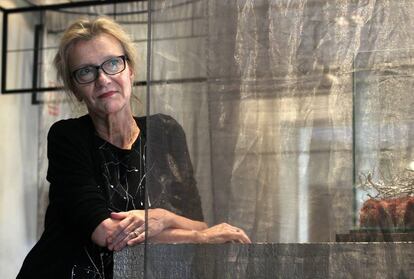Elizabeth Strout, novelist: ‘I don’t see how we in the US can find a way to come back together as a country’
The author of ‘Lucy by the Sea’ describes what drives her writing: ‘I have always wanted to know what it feels like to be another person’


Elizabeth Strout knows how to descend to the most intimate depths of non-epic characters and capture the essence of their feelings. Then, she turns their anxieties and struggles into an epic of its own. And with that, everything is said.
But itt’s always worth knowing more. Strout works with her stories like Woman Ironing — a painting by Picasso, which depicts a woman pressing an iron with both hands, until every wrinkle is smoothed out. The American novelist achieves this in Oh William! — a finalist for the Booker Prize — and did it again last year with Lucy by the Sea, the latest installment in a series that began in 2016 with My Name is Lucy Barton.
A writer who achieved success late in life, her literary production has accelerated in recent years, with a growing number of readers and awards. Her ability to dig deep into the human soul was first recognized in 2009, when she won the Pulitzer Prize for her novel, Olive Kitteridge.
In her most recent novel, she has placed Lucy Barton in the territory of perplexity that was caused by the pandemic. As the character struggles to make decisions in the face of an event that none of us had ever previously experienced, a palette of sensations comes through, which all readers can recognize: loneliness, doubt, the fragility of family ties and friendship. Lucy by the Sea isn’t a novel about the pandemic per se (a subject that’s still anathema for many readers), but is instead about the feelings it caused. Especially in the context of division, which the U.S. experienced simultaneously.
Born in Portland, Maine 67 years ago, Strout took questions from EL PAÍS via video call.
Question. Trumpism is present in your book, as it has to do with the pandemic and the notion of coexistence in the United States. How do you see coexistence in your country now? Is it harder than before?
Answer. It’s becoming more and more difficult. There are divided families who choose not to speak [about politics], or even see each other. There are divided friendships… or the friendships end. This isn’t getting any better.
Q. Do you think it will get worse? Are you pessimistic?
A. I fear that it will get worse. My husband thinks we’ll get over it, but I’m more negative. I don’t see how we can get past it, how to find a way to come back together as a country.
Her novel avoids mentioning Donald Trump by name — she didn’t want to give him such a personal role in the book. However, she does capture the presence of a divisive president, as well as the atmosphere of a society broken by its disagreements and stunned by the assault on the Capitol, which took place in January 2021. “I wanted to record what was happening in my country without a political point of view, without giving the names of leaders. I really was just trying to record Lucy Barton’s version of the pandemic in a way that, I hoped, could be universal to some extent.”
During the pandemic, the protagonist and her husband — William, who readers will recognize from the previous novel — take refuge in a house on the coast of Maine. There, they face animosity from some of their neighbors, who hate New Yorkers. It comes to the point that they have to change their license plate to hide where they come from.
“It’s the old confrontation between the city and the countryside,” Sprout notes. “A lot of people in Maine don’t know New York — they think of it as a foreign country, they look at it with fear.” During Covid, she felt enormous homesickness for the Big Apple. “I missed my friends so much, I missed all those little relationships that you have… You miss the dry cleaner on the corner, the man who serves you bagels and coffee every morning. You meet those people every day. I missed all of that, because New York has so many people, so many different sizes, shapes and colors, walking down the sidewalk all the time. I’ve always just loved that.”
Q. Did anything good come out of the pandemic that has stayed with us?
A. I think people understand the value of a good friendship more than before. We’ve learned to appreciate the human contact that we took for granted.
Strout emphasizes that Lucy Barton is a literary construction, with no autobiographical elements. However, both Elizabeth and Lucy share the same settings (Maine and New York) and profession. “Since I started [writing the character], I was aware that people would think that it’s me, but it’s not. She’s a literary construction. And it’s okay, let them think what they want, but it’s not me. I just use her eyes and her voice to tell a story.”
Q. How do you live with her and with all the other characters that you’ve created in your novels?
A. When I write, I try to stay within the character of the character. I spend so much time with each one and focus so much on them that they become very, very real to me. And, when I’m done, they don’t disappear; they just keep going around in my mind.
Her agent, Molly Friedrich, has described Strout’s writing process in The New York Times, using Picasso’s Woman Ironing as a reference. “She has such an emphatic way of smoothing and folding sentences that may seem simple… but what they really are is focused.”
Q. Is that how you write? As if you’re ironing the phrases by pressing them with both hands?
A. I write in scenes; I’ve been working based on scenes for years, since my daughter was little and I could only dedicate a couple of hours a day [to writing]. Those scenes appeared to me as something immediate and achievable at that moment — all of them together, little by little, were making up the book. And maybe that’s why my agent is referring to that woman ironing, because I always go over them until I can connect them all together.
Strout published her first novel at the age of 42. It took a long time for the second to come out. But now, she publishes one practically every year, with increasing success and public recognition, with her work even having been adapted to film and television. “I guess I feel like I’ve been training for a marathon. My daughter runs marathons and I watch her train. And I’ve also been training so long and so hard, and now I’m running that marathon. I feel like I finally figured out enough about writing to be able to do it.”
Q. Why do you write?
A. Writing was my first connection to the world. My mother gave me a notebook when I was four-years-old. She said: “Write down what you did today.” And so I did. I was just learning to make sentences. And that was my first understanding of taking something that happened during the day and putting it down on a piece of paper. And I’ve just been doing it ever since.
Q. How would you define your style?
A. The Lucy books are much more concise. And that’s because of her voice. Lucy’s voice is sort of whispering to you, you know? That’s what marks the style of writing. But then, other times, I’ve had a larger narrator who takes a step back and takes it all in. That’s a little bit of a different style. But I like to think that I’m plainspoken.
In Lucy by the Sea, there’s a phrase uttered by the main character, which Strout finds to be particularly valid. It occurs when she describes a police officer who has to issue someone a fine during the pandemic: the protagonist explains that the act of trying to understand the officer is what has made her a writer.
Q. Is this the engine of your career as a writer? Trying to understand others?
A. Yes, that’s me. Lucy isn’t me in general… [but in that regard], she is. There weren’t a whole lot of people around when I was a kid. And so, every time I saw a person, I was fascinated. And I just want to say that I still believe there’s nothing more interesting than people. For me, every single person is so complicated and so interesting… We can only know a small part of that person. But yes, I have always, always, always wanted to know what it feels like to be another person.
Sign up for our weekly newsletter to get more English-language news coverage from EL PAÍS USA Edition
Tu suscripción se está usando en otro dispositivo
¿Quieres añadir otro usuario a tu suscripción?
Si continúas leyendo en este dispositivo, no se podrá leer en el otro.
FlechaTu suscripción se está usando en otro dispositivo y solo puedes acceder a EL PAÍS desde un dispositivo a la vez.
Si quieres compartir tu cuenta, cambia tu suscripción a la modalidad Premium, así podrás añadir otro usuario. Cada uno accederá con su propia cuenta de email, lo que os permitirá personalizar vuestra experiencia en EL PAÍS.
¿Tienes una suscripción de empresa? Accede aquí para contratar más cuentas.
En el caso de no saber quién está usando tu cuenta, te recomendamos cambiar tu contraseña aquí.
Si decides continuar compartiendo tu cuenta, este mensaje se mostrará en tu dispositivo y en el de la otra persona que está usando tu cuenta de forma indefinida, afectando a tu experiencia de lectura. Puedes consultar aquí los términos y condiciones de la suscripción digital.








































